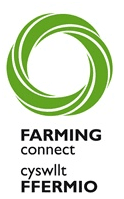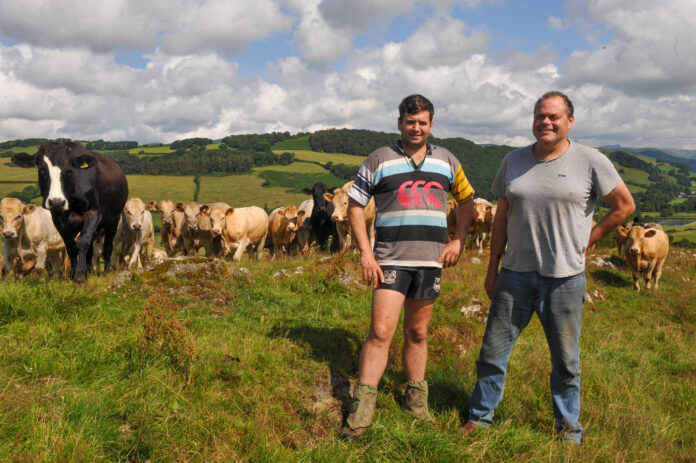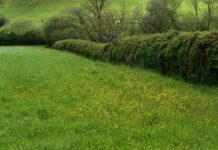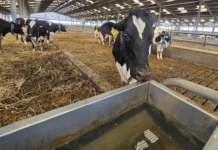 A fifth generation Welsh sheep and beef farm has resolved a succession conundrum by bringing a young farmer into the business as a partner.
A fifth generation Welsh sheep and beef farm has resolved a succession conundrum by bringing a young farmer into the business as a partner.
Ben Ryder’s family have farmed Maesmachreth, an upland farm near Machynlleth, for two centuries.
With neither of their daughters interested in taking it on, Ben and his wife, Kate, had uncertainties about its future.
“Ben’s family have been farming here for 200 years and with that comes a big responsibility, we didn’t want to be the generation that let it go,” says Kate.
“We have always regarded it as being a good farm and we didn’t want it to go to waste.”
As they approached their sixties and with periods of ill health, they admit they had “run out of steam” and that was starting to impact on the farm.
“We realised we weren’t as indestructible as we thought we were,” says Ben. “Farming is not the sort of thing that you can stand still on, when you do you go backwards and we were seeing that starting to creep in.”
They sought advice on succession through Farming Connect – eligible farmers can book a fully-funded one-to-one meeting with a specialist solicitor at a ‘Succession Planning’ surgery.
“From that we narrowed down what our options were,” says Ben.
“We felt it would be difficult to rent the place out and continue to live here and we weren’t ready to walk away altogether, we still wanted to be involved.
“We wanted more than a farm worker though, someone who was prepared to make a commitment for the longer term.”
It was Farming Connect’s Start to Farm programme that provided the answer.
Start to Farm, a matchmaking service designed to pair up landowners who are looking to step back from the industry with new entrants, offers funding for business planning and legal guidance.
The Ryders put themselves forward as a provider and Farming Connect promoted this opportunity.
In the neighbouring village, at Dinas Mawddwy, that opportunity came to the attention of Ynyr Pugh, who had been brought up on a smallholding and was ambitious to get a foothold in farming.
After studying at Glynllifon College and the Welsh Agricultural College, he had spent time shearing sheep in New Zealand and Wales and had worked on different farms.
Some of his friends had been successful matched with farmers through Start to Farm.
“I was intrigued by Start to Farm but I wanted if possible to be based close to home and until the opportunity at Maesmachreth came up there hadn’t been anything local,” Ynyr explains.
He provided the Ryders with a profile of what he could offer.
He was among several candidates but he was the one who ticked every box for the couple.
“We are very similarly minded, we want to farm in the same way and to make the farm more resilient by reducing our reliance on external factors,” says Ben.
Funding from Start to Farm paid for business planning and the legal formalities associated with drawing up the agreement.
As a first step, Ynyr worked with Ben and Kate as a contractor, to allow both parties time to get to know each other better before committing further.
On 1 April 2024 they took the next step, making Ynyr a business partner with a 34% partnership share; they each have 33%.
Over the next eight years Ynyr will acquire an additional 1% annually after which he will become the majority shareholder.
When they reach that point they will look at how the situation might develop, such as through a Farm Business Tenancy.
It has been a positive experience for both the Ryders and Ynyr.
“We are far more enthusiastic about farming since Ynyr joined us,” says Kate.
So much so that they have already made changes to the sheep flock and suckler herd and are increasing both ewe and cow numbers.
The flock had been mostly Texel-crosses but the breed wasn’t the best match for the land type, which rises to 1,200 feet at its highest point.
With Ynyr’s influence, Romney x Aberfields have been introduced, allowing the flock to move towards an outdoor-lambing system. Numbers have been increased from 600 ewes to 700.
There are changes in the suckler herd too; Stablisers have been introduced to replace Limousin-cross genetics.
There is a plan to grow herd size from the current 90 too. “The Stabiliser is a smaller breed so we can keep a few more of them on the same area,” says Ben.
Ynyr is grateful to Ben and Kate for helping him to realise his ambition to farm and to Farming Connect for providing the platform which enabled that.
“Start to Farm is both keeping people in the industry and bringing new entrants in,” he says.
He had looked at renting a farm but didn’t have the capital he needed to get started and was competing against existing businesses for those opportunities.
He describes Start to Farm as a “win win” for all parties.
Ben and Kate say their situation might not provide a blueprint for all farmers. “Every single system is going to be different,” says Kate. “For us it was important that there had to be a probation period, a chance to work together for long enough before taking it further.”
Communication and openness from the outset are key, Ben adds. “There needs to be trust from the very beginning.”
Ynyr, who sees a bright future in farming, encourages others to use Start to Farm.
“Talk to the people at Farming Connect, tell them what you would like from the situation,” he advises.
“I had all the fundamentals to run a farm but didn’t have the land to apply those.”
He has gained a great deal of knowledge from the Farming Connect Prosper From Pasture grassland management programme and has also benefitted from the Farming Connect Mentoring programme with sheep farmer Meirion Jones as a mentor.
Both he and Ben are members of a Farming Connect sheep discussion group too and have made good use of knowledge transfer events at Farming Connect ‘Our Farms’ farms.
“Picking up different ideas from different people is very important,” Ynyr reckons. “There is no point in doing the same old thing if something isn’t working and expecting a different result, you need to tweak the system all the time.”

| [donate]
| Help keep news FREE for our readersSupporting your local community newspaper/online news outlet is crucial now more than ever. If you believe in independent journalism,then consider making a valuable contribution by making a one-time or monthly donation. We operate in rural areas where providing unbiased news can be challenging. |


















